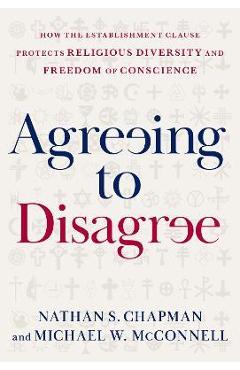Agreeing to Disagree: How the Establishment Clause Protects Religious Diversity and Freedom of Conscience - Nathan S. Chapman

Detalii Agreeing to Disagree: How the
libris.ro
144.38 Lei
180.47 Lei
Law
Nathan S. Chapman
Agreeing to Disagree: How the - Disponibil la libris.ro
Pe YEO găsești Agreeing to Disagree: How the de la Nathan S. Chapman, în categoria Law.
Indiferent de nevoile tale, Agreeing to Disagree: How the Establishment Clause Protects Religious Diversity and Freedom of Conscience - Nathan S. Chapman din categoria Law îți poate aduce un echilibru perfect între calitate și preț, cu avantaje practice și moderne.
Preț: 144.38 Lei
Caracteristicile produsului Agreeing to Disagree: How the
Comandă Agreeing to Disagree: How the Online, Simplu și Rapid
Prin intermediul platformei YEO, poți comanda Agreeing to Disagree: How the de la libris.ro rapid și în siguranță. Bucură-te de o experiență de cumpărături online optimizată și descoperă cele mai bune oferte actualizate constant.
Descriere magazin:
In one of the most thorough accounts of the Establishment Clause of the First Amendment, Nathan S. Chapman and Michael W. McConnell provide an insightful overview of the legal history and meaning of the clause, as well as its value for promoting equal religious freedom and diversity in contemporary America. The Establishment Clause of the First Amendment, Congress shall make no law respecting an establishment of religion, may be the most contentious and misunderstood provision of the entire U.S. Constitution. It lies at the heart of America\'s culture wars. But what, exactly, is an establishment of religion? And what is a law respecting it? Many commentators reduce the clause to the separation of church and state. This implies that church and state are at odds, that the public sphere must be secular, and that the Establishment Clause is in tension with the Free Exercise of Religion Clause. All of these implications misconstrue the Establishment Clause\'s original purpose and enduring value for a religiously pluralistic society. The clause facilitates religious diversity and guarantees equality of religious freedom by prohibiting the government from coercing or inducing citizens to change their religious beliefs and practices. In Agreeing to Disagree , Nathan S. Chapman and Michael W. McConnell detail the theological, political, and philosophical underpinnings of the Establishment Clause, state disestablishment, and the disestablishment norms applied to the states by the Fourteenth Amendment. Americans in the early Republic were intimately acquainted with the laws used in England, the colonies, and early states to enforce religious uniformity. The Establishment Clause was understood to prohibit the government from incentivizing such uniformity. Chapman and McConnell show how the U.S. Supreme Court has largely implemented these purposes in cases addressing prayer in school, state funding of religious schools, religious symbols on public property, and limits on religious accommodations. In one of the most thorough accounts of the Establishment Clause, Chapman and McConnell argue that the clause is best understood as a constitutional commitment for Americans to agree to disagree about matters of faith.

Produse asemănătoare
Produse marca Nathan S. Chapman

Agreeing to Disagree: How the Establishment Clause Protects Religious Diversity and Freedom of Conscience - Nathan S. Chapman
![]() libris.ro
libris.ro
Actualizat in 25/10/2024
144.38 Lei